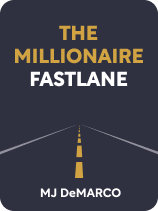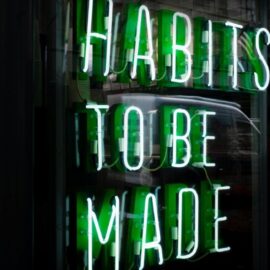

This article is an excerpt from the Shortform book guide to "The Millionaire Fastlane" by MJ DeMarco. Shortform has the world's best summaries and analyses of books you should be reading.
Like this article? Sign up for a free trial here .
Do you ever make purchases even though you know they will put you in debt? Do you know how spending more than you earn can affect you for years to come?
In his book The Millionaire Fastlane, MJ DeMarco discusses insatiable consumption, or the never-ending desire to spend money. While spending money isn’t fundamentally a bad thing, if you spend more than you earn, you are dooming yourself to a lifetime of poverty.
Here’s why you should think twice before buying things you don’t need.
Insatiable Consumption
DeMarco defines the Insatiable Consumption formula for wealth as: job + debt = a lifetime of poverty. He argues that insatiable consumers are more motivated by the illusion of wealth than actual wealth. According to him, spending more than you earn on luxury items and experiences will make someone feel like they deserve the best without having to work for it. They also crave the pride, admiration, and respect that rich people enjoy, and they believe that they can achieve the same positive feelings simply by looking rich.
(Shortform note: In the same way it creates an illusion of wealth, buying things to impress or outdo others creates an illusion of happiness. In The Happiness Hypothesis, Jonathan Haidt explains that the desire to project wealth limits your ability to feel intrinsically happy because it leads to an endless competitive cycle: You feel happy when you buy something that projects wealth. However, when someone else buys something more expensive, it devalues your purchase and leaves you dissatisfied. The only way you can maintain happiness is to continue purchasing increasingly expensive things so no one outdoes you.)
Seeking Short-Term Gratification Risks Long-Term Security
DeMarco explains that this attitude disregards the effort and persistence required to create wealth in favor of the quick fix of using credit to impersonate wealth. While credit (loans and repayment plans) allows you to spend far more than you earn, it destroys your chances of creating actual wealth and freedom. It forces you to work long hours and commit all future income towards debt repayment. This limits your ability to funnel money toward your financial security (pension and savings accounts), forcing you to live paycheck to paycheck. This lifestyle creates financial stress that negatively impacts your health, relationships, and your sense of freedom.
Further, DeMarco warns that when you don’t have money to spare, you lack control over your finances because you’re at the mercy of external factors: job losses, economic recessions, credit interest hikes, and mortgage inflations. Any one of these factors can destroy your credit rating, further negate your net worth, and bankrupt you.
(Shortform note: Financial advisors agree that debts coupled with a lack of savings put you at risk of unforeseen external factors, and they generally recommend that you clear your debts first and then allocate money into a savings account. However, large debts may take years to pay off, and without any savings to fall back on, you’ll still be at risk of financial struggle. In The Automatic Millionaire, David Bach suggests that you prioritize saving to best protect yourself from unforeseen circumstances—set aside at least one month’s worth of savings before focusing on clearing your debts. If the worst happens, you’ll avoid getting into further debt because you’ll have savings to rely on.)
| Not All Credit-Users Are the Same It’s well-known that relying on credit creates debt that restricts financial freedom and has negative consequences in many areas of life. However, DeMarco’s conclusion that people rely on credit because they’re either ignorant of its risks or too vain to care is arguably reductive—many people understand the risks but have no other options. A recent survey revealed that 37% of low-income and middle-income households rely on credit cards to cover basic living expenses such as groceries and utilities. Further, people who rely on credit tend to work longer hours or take on a second job just to cover their debts and survive—they’re not motivated by the illusion of wealth but by the need to survive. They work much harder than the type of person DeMarco describes in this section. |
Financial Outcome: Poverty
DeMarco argues that if you buy things you can’t afford without considering the impact this has on your financial security and lifestyle, you’ll never accumulate wealth. This applies even if you earn a high salary—spending more than you earn always leads to poverty.
How to Avoid Lifestyle Creep: Spend Mindfully
Even high earners risk spending more than they earn—research shows that the more you earn, the more you’re likely to increase your spending. This is due to a phenomenon called lifestyle creep: As your income increases, the more entitled you feel to waste money on things you formerly viewed as unnecessary treats or luxuries. This increase in spending happens incrementally, so it’s often difficult for you to recognize that it’s happening.
Financial advisors suggest that you can break free of the urge to overspend by becoming conscious of your spending habits and sticking to a budget—common advice includes tracking your spending habits and eliminating all unnecessary expenses. In contrast, Ramit Sethi (I Will Teach You to Be Rich) suggests that if you focus on spending mindfully, you can quit overspending without eliminating expenses that are unnecessary, but bring you joy—for example, if you love indulging in fine wine. To spend mindfully, split your expenses into four areas, decide how much you want to spend in each area, then allocate a portion of your income to each:
- Fixed costs (rent, living expenses)
- Investments (savings and retirement)
- Savings goals (vacations and large expenses)
- Guilt-free spending (anything that makes you happy)
Sethi suggests setting up a system that won’t let you spend more than you’ve allocated to any of these areas. He argues that this process is more effective than budgeting or eliminating expenses because you don’t waste time tracking where each dollar goes. In addition, you give yourself permission to spend a portion of your income in any way you wish. While this goes against common financial advice, you’re more likely to stick to your financial goals if you don’t constantly deprive yourself of the things in life that bring you joy.

———End of Preview———
Like what you just read? Read the rest of the world's best book summary and analysis of MJ DeMarco's "The Millionaire Fastlane" at Shortform .
Here's what you'll find in our full The Millionaire Fastlane summary :
- The three formulas that all conventional financial strategies follow
- Why these formulas represent shortcuts that don’t guarantee financial freedom
- How to generate a massive income in a short time






